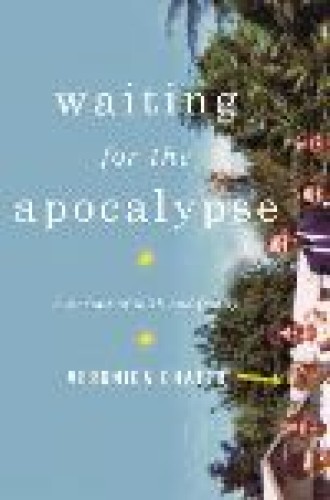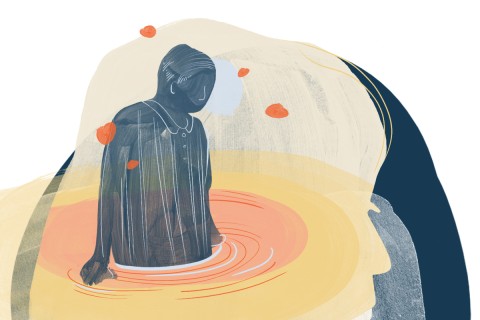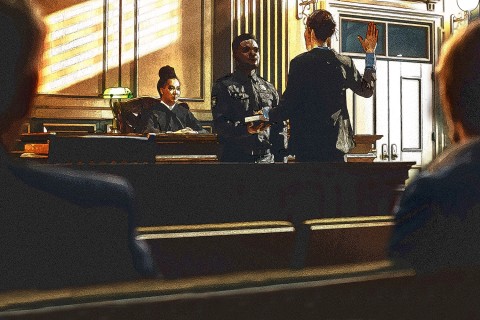Waiting for the Apocalypse/Dating Jesus
A fundamentalist childhood has become a hot commodity on the literary market. Memoirs like Born Again and Again, by Jon M. Sweeney; My Fundamentalist Education, by Christine Rosen; and Frank Schaeffer’s much discussed Crazy for God, about his childhood at L’Abri Fellowship and involvement in the religious right, have given readers a glimpse into the world of fundamentalist Christianity. Waiting for the Apocalypse, by Veronica Chater, about her family’s search for a Catholicism free from Vatican II liberalizations, and Dating Jesus, Susan Campbell’s account of a gender-circumscribed Protestant childhood, are the two most recent works in the widening pool of literature about growing up fundy.
Cynics may ask whether these writers are simply mining the quirks of cradle fundamentalisms in an era in which ethnic and cultural peculiarities sell. Yet it may also be that fundamentalism nurtures the literary imagination in unique ways. Through the value it places on details and difference, on the disciplines that underwrite daily life, on the primacy of text and on the cosmic narratives of good and evil, fundamentalism may prove a better breeding ground for the literary life than a thoroughly secular American childhood.
The authors of Waiting for the Apocalypse and Dating Jesus experienced two distinct brands of fundamentalism: the first, highest-of-high-church Catholicism (as in Tridentine Mass and pre–Vatican II traditionalism); and the second, low-church, primitivist Protes tantism (as in lowercase c church of Christ, which Campbell calls “frontier revivalism frozen in amber”). What is fascinating is the synchronicity between the two groups—the fear of modernity, the hunkering-down separatist stance, the eschatological clarity, the theological absolutism—even while the particulars of the faiths could scarcely be more divergent. Both authors mention the dim view their child-selves held of the opposing group. Campbell writes of proselytizing door-to-door as a child (“Bagging a Methodist would be nice, but a Roman Catholic—or a Jew, if we could find one!—is even better!”), and Chater re calls her belief that after Vatican II “Catholics everywhere were behaving like Protestants, which was only one step away from being atheists.” Yet while fighting from different ecclesial fortresses, the fundamentalists in the pages of both books agree on some common enemies. Campbell writes that her church fears “modernity more than Satan,” and Chater’s father calls progressivism a disease, “like gangrene”: “It continues to eat away at truth until you can no longer see truth beneath the thick layer of rot.”
Pre–Vatican II truth is the aspiration of Chater’s parents, who took their 11 children on a constant, restless and often penniless hunt for a Catholic utopia. Her father, a counterrevolutionary convinced that the Catholic reforms of the 1960s were a “conspiracy between the Communists and the Freemasons to bring the Catholic Church to its knees,” moved the family to Portugal in order to be closer to the town of Fátima, where the apocalypse (known as the “Chas tisement”) was prophesied by three shepherds, and where he eagerly anticipated being able to attend Latin Mass. He rented a house in an isolated village near Fátima and there awaited financial support and direction from a like-minded revolutionary patron in the States (support and direction that never came).
As the family entered the village church on their first Sunday there, they discovered the extent of their father’s error: the church had air-conditioning, lacked a baptismal font and shrines, and had a cross “as clean and vacant as a brand-new piece of Scandinavian furniture.” A man in a sweater led the music with a guitar, and a priest in a light-blue gown walked around and shook everyone’s hands. “We’d come all this way for a mass that wasn’t here,” Chater writes. “It was strange to be wrong about something that had seemed so right. There was something decidedly unnerving about being that wrong.”
Several months later they returned to California (so poor that their mother’s carry-ons on the trip home were literally a sponge mop and a broom—“They’ve got a lot of use left in them”). Their father coped with his disillusionment by moving through a series of low-paying jobs and taking his family to gatherings of schismatic Catholic groups meeting in garages and empty department-store buildings.
Just when you think the author’s father could not become more radicalized, he did. By the time Chater was an adolescent, he was stocking the garage of their tiny house with emergency supplies and firearms and knives for the coming Chastisement and linking up with a Brazilian antirevolutionary group complete with warrior monks. She and her sisters were no longer allowed to wear pants or listen to rock music, and two of her brothers were sent to a militaristic Catholic school in New York.
Fissures in her father’s apocalyptic vision for his family eventually appeared: Chater’s older sister got pregnant, Chater herself was raped by the father of two children she baby-sat (although her parents assumed she was having an affair), and her brothers fled their Catholic school, claiming that it was a cult and that they were being brainwashed. Chater brings her memoir to a close with a furtive bus trip to sign up for courses at a community college. Today only one of her parents’ 11 children remains Catholic—and it’s not her. “Faith cannot be force-fed,” Chater writes in her last chapter. “It seems to come either naturally or not at all. To believe in a dogma, you must be trusting, and compliant, and willing to take the word of someone else as to what life is all about, whether or not it contradicts logic.”
Such a hurried disavowal of faith seems a rather listless denouement to an otherwise lively memoir. I wonder whether Chater is forthcoming about all the losses that accompanied her renunciation of the habits of faith. Isn’t there any part of her that misses rosary beads, or communion wafers on the tongue? Didn’t any of the rituals hint at the possibility that God interacts with humanity? While Chater’s own sons won’t learn the rigid lessons of fundamentalism, it appears that they will also miss out on the consolations and disciplines of a household faith. On the other hand, perhaps the assiduousness with which Chater crafts her story is testament to a continuing religious longing that she does not otherwise assert. Indeed, she is amazingly compassionate toward her parents, whom most readers will find disturbingly irresponsible in their fervency.
Campbell, author of Dating Jesus, describes such religious longing—an impulse within some people raised fundamentalist, even if they leave the church—as “a deep and soulful need.” More than Chater, she finds words for the way that fundamentalism (as her brother put it) “broke off in us,” and she ends her book with something akin to a confession of faith (even though, like Chater, she has largely left the religion of her childhood and no longer attends church). Campbell attended seminary, calls herself “Christ-haunted,” and describes a nighttime epiphany she had as an adult, in which she realized that the Jesus of her childhood was the wrong Jesus—“a construct that had only a small basis in fact.” She writes of weeping upon hearing a cappella hymns from her childhood and admits that when she visits churches these days, she has a tendency to “hold them up to my own church—the church I have, oddly, rejected—and still find them wanting.”
Campbell’s memoir pivots on the gendered nature of a fundamentalist girlhood and on the countless ways she chafed against the boundaries of religious patriarchy. She recounts a conversation that she had as a child with a Sunday school teacher, in which she made an impressively informed case for why the church of Christ is wrong to limit leadership roles to men. Frustrated by the interruption to his lesson and Campbell’s refusal to back down, the teacher went to get her mother and told her that her daughter had had a question, that it had been answered, and that her mother should take her to the nursery to help out for the rest of the period. “The meaning is not lost on me,” Campbell writes. “For asking questions, I will be placed among babies who slobber and fill their pants. It is a public shaming.”
Campbell writes of a later rebellion against all things traditionally female: she crossed her eyes during photographs while in the high school homecoming court. Later she was scolded by a high school teacher concerned that “a good Christian girl would act in such a manner.” “And what, precisely, does it mean to be a good Christian girl?” Campbell writes. “It is the most damning of phrases, capable of felling the most confident of young women. ‘Good Christian girl.’ You either are one or you aren’t.”
By adulthood, Campbell had shed that moniker and was no longer “dating Jesus”—no longer going to his house thrice weekly, listening to his stories or singing songs to him. She became a journalist who writes frequently about the intersection of faith and politics but who stands aside from the church, “a woman without a home.” Campbell’s narrative reflects less of a literary sensibility than Chater’s. It alternates between memoir; research into fundamentalism, feminism and modern evangelicalism; and a biblical exploration of Jesus’ interactions with women. It is marred by a self-conscious voice and narrative footnotes in which Campbell tries too hard to be clever. All the same, it is a moving account of closely cinched fundamentalist girlhood. A friend of mine who grew up in the same tradition as Campbell’s read the book and claims that it is pitch-perfect.
Whether Campbell and Chater emerged from their dogma-driven childhoods any more or less scarred than your average American kid is open to debate—although in a competition of religious dysfunction, Chater’s counterrevolutionary Catholic childhood definitely deserves a prize. For both authors, Campbell’s brother’s statement that fundamentalism “broke off in us,” like a sword, seems a poignant metaphor for the injuries suffered. Fortunately for the rest of us, their chosen salve for those wounds is the writing of astute and vivid prose.






